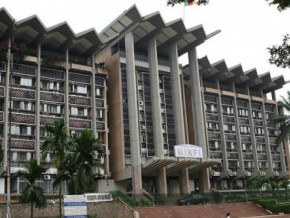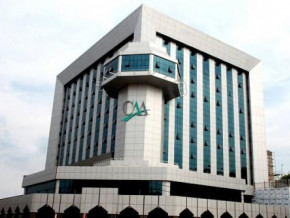
Viviane Ondoua Biwolé: “One of Cameroon’s gravest mistakes is to not give enough attention to human resources”

(Business in Cameroon) - The former deputy managing director of the Higher Institute for Public Management (ISMP in French) is recognized in Cameroon as one of the leading experts in terms of public governance. Professor at the Yaoundé II University and Assistant Professor at Yale University, U.S, Viviane Ondoua Biwolé has published about six books on this topic. Recently, at the national conference for the modernization of Cameroon’s public administration, she assessed some of the issues that impair the performances of this administration.
Business in Cameroon : From January 13 to 15, a national conference was held in Yaoundé. It focused on the modernization of Cameroon’s public administration. On this occasion, you said the public administration’s Achilles heel is the human resource. What do you mean clearly?
Viviane Ondoua Biwolé : We must first agree to this undeniable truth: human resource, which is flexible and modulable, is considered as highly decisive. It transforms other resources and gives them meaning. Unfortunately, in Cameroon, the public administration doesn’t give much attention to this component. Apparently, Cameroon has developed a long-term strategy (for growth and employment), at sectoral and ministerial levels, without doing the same for human resources. And while human resources are considered the social pillar on which production lies, they were not paid as much attention as production. There is no strategic management document related to human resources.
In addition, in most ministries (29 out 37), the human resource component at the operational level is grouped with material and financial components within general affairs directorates. In this context, all human-resource-related issues are handled by one general chief of staff, who does not always fit the profile of the job. Only eight ministries (21%) have a separate human resource department. And even here, those heading these departments do not meet the job’s requirements. This situation is often due to the fact that the appointment of the concerned officers is not always made in line with professional standards in place. In such a context, it is easy to understand why public policies struggle to be executed efficiently, and also why projects have so little impact.
Looking at all these, we maintain that appointing inadequate human resources in State entities is in a large part responsible for the poor performances of these institutions and administrations. One of Cameroon’s gravest mistakes is to not give enough attention to human resources.
BC : You also speak of another issue that plagues Cameroon’s administration, and that is a “scrambled identity” as you call it. How do you define this weakness and what are its consequences?
VOB : Scrambled identity is a situation characterized by a clash of ideologies, and incoherence. In public administration, there is a contradiction between regulations in place and actual practices. For example, in the last 10 years, new terms derived from the private sector were introduced into the public management sector, such as performance requirement, result-based management, and transparency requirement. At the same time, the leadership in place is far from appropriating these standards, as the latter first requires sound democratic practices to be in place. Though it should not be seen as an excuse, it seems that this situation is due to public officers having trouble accepting the paradigm shift. The shift from a stiff hierarchy-based bureaucracy, one where chiefs are “almighty,” omnipotent and all-knowing and demand full obedience, to them and their rules, to a more flexible system, based on teamwork and participatory management.
This voluntarily sustained “scrambled identity” renders structural reforms hard to implement and inefficient. Rather than effective tools, these reforms, which are leaned to a new paradigm and the new legal framework that supports it, are more like good faith tools. This results in two frequent situations. First, intermediate-level officers, wanting not to assume responsibility for their actions, are unwilling to make important decisions as they wouldn’t risk being punished by their high-ups who don’t really encourage innovation. The second issue relates to officers feeling insecure, legally, as they cannot rely on new regulations which are effective due to inertia or various headwinds.
In both cases, service quality is impaired. Complaints multiply and awaited structural changes are delayed. Delays in project development have become so usual that they are no more viewed as an issue. When questioned about their actions, officials at fault often respond: “Better late than never!” This is a really sad admission of failure, alas! It’s even better to not try to find out the losses of various partners (suppliers, banks, beneficiaries, etc.) in this context as very little concern is shown in this regard.
BC : How do these issues impact the performances of the administration and State companies?
VOB : The impact of this conceptual incoherence translates into the public administration and entities having difficulties improving economic performances. Actually, reports from the ministry of finance, the World Bank, and the International Monetary Fund recognize that public institutions have been recording poor performances for almost 10 years now. And I believe the low quality of human resources is the main reason for these poor performances.
Knowing that skill is defined as the ability of any individual to use their knowledge
to solve organizational issues, we can simply deduce that public officers are incompetent! And scrambled identity, which we talked about earlier, is insidious and disastrous. It slowly takes over individuals’ cognitive reasoning and controls their decision-making processes.
People are socially situated. This means that how they perceive any given event is conditioned by their position, their disposition, but also by theoretical tools and institutions allowing them to give “meaning” to surrounding realities. Now, given this conceptual mismatch, we may fear that public leaders take decisions that are disconnected from actual needs and such decisions have immense consequences, on finances, information and even human lives.
BC : In your last book, “Scandals. Using casuistry to achieve organizational sustainability in Cameroon,” you talk about three organizational weaknesses our country faces: managerial abuses, the interference of the Presidency, and institutions’ shortcomings. What is the relationship between these and the issues you stressed on at the conference on modernizing public administrations?
VOB : Leadership in the public administration, ethics, and the emergence of a new type of public officers are factors that help tackle the issues I talk about in my book. As for the interference of the President of the Republic in organizational issues, it was not discussed during the conference. It wasn’t even mentioned. This is understandable since it is tied to the political system and to the much-protected concept of its “discretionary power.”
While this interference is admitted for particular officials, what is deplored is its abusive occurrence. Those who deplore this stress on the need to respect the regulatory framework of the discretionary power, which forbids officials from discriminating.
On one side some defend that the public policies should be able to act without any constraint while others, and I share their opinion, say they should respect a minimum of managerial rules, which are based on a legal framework. We are firmly convinced that the training and beliefs of many leaders and their history in public administration sustain the confusion surrounding discretionary power.
Anyway, a strict political rationale can exist only in a context of abundance with the distribution of resources as the main concern. This is not yet the case here. Today, the focus is more on producing than distributing, with resources reducing more and more.
BC : In 2017, a reform was engaged to tackle the low performance of State companies. How far have things improved since then?
VOB : This reform was introduced in 2017 and focused mainly on two areas. The first is legal, and several legislative texts were elaborated (two laws, three application decrees, and others considered as complementary). In total, 11 new texts helped regulate public entities’ actions. As for the second area, it is related to the binding of organic laws to the new provisions of the 2017 laws.
We have however noticed that the elaboration of new rules contrasted with the lack of compliance to them. These include the non-respect of the mandates of managing directors, deputy managing directors and heads of administration boards, the unavailability of tools and functions required.
BC : What are the factors delaying the implementation of this reform?
VOB : This reform confirms the following saying: Societies are not changed by decrees. It is hard to understand why it is being delayed. But shouldn’t we first relativize the term “delay” considering the various components of the reform which are given priority?
As it is, the reform was planned. The legislative texts contain details relative to delays and procedures required for the implementation of the reform. In spite of this, many of these provisions are not applied. Since I have not had access to all documents preparing the reform, I will proceed through assumptions. I have three hypotheses.
The first is that, though the delays are strict, the government hesitates to apply all of the reform’s components and are taking some time to do so progressively. In this context, many leaders could see their legitimacy contested. These texts render some of their decisions and actions illegitimate.
The second hypothesis is focused on selfishness and games aimed at maintaining the status quo, ignoring legal provisions and the general interest. If not, how do you explain the fact that social leaders whose mandates expired long ago are still in office? How do you explain the violation of laws that establish the authority of public entities?
My third assumption reveals the incompetence of the administration (inertia, low capacities, difficulty to implement all three phases of the reform, denial of responsibility, and incivism). These three assumptions are for the most part based on the backbone of the managerial paradigm.
BC : In the event that it is fully implemented, can this reform allow public companies to boost their results?
VOB : Yes, of course! That’s its purpose. Nothing is created to fail! What must be done is to put in place the right framework to ensure the expected shift. Since this is an important reform, appropriate indicators must be set to ensure that progress is made.
BC : What else can be done to boost the performances of these companies (they all record insignificant results according to the ministry of finance and the World Bank)?
VOB : In the new legislation, all major issues have been addressed. What’s left therefore is to produce expected transformations, secure flexible human resources, guarantee efficient regulation and have adapted governance tools. I can’t imagine any action being taken as long as this reform is not implemented.
Now, the next step is to find out who in the political chain has not revealed all their cards. This is a situation that prevents a sound public action while fostering inertia in the decision-making process.
The truth is that delays defined in texts are not aligned with real delays characterizing the administrative system. Also, all the good intentions we find in these texts seem to oppose the interests of leaders who are in charge of translating them into concrete actions. All institutions in charge of controlling and sanctioning the government’s actions show an impressive indifference concerning the abuses.
BC : Is there a link between the actual performances of the public administrations and that of private companies?
VOB : Obviously! In any given country, all systems are linked. Very few business formalities of private firms do not involve the administration or State institutions. Also, State procurements represent business opportunities for the private sector.
Both sectors, the public and private, mutually influence each other. So, a poor performance of the public administration hampers that of private firms, and vice-versa.
BC : During a recent inaugural lecture, you stated that a dominant number of Cameroonian managers only seek to satisfy their selfish interests. You then urged more altruism in their management. How could the private sector benefit from following your advice?
VOB : We’ve all known for a long time that selfish interests serve no business, neither private nor public. To have proof of this, let’s review business theories. You’ll notice that governance models evolved from corporate governance (where only shareholders’ interest matter in relation to production and redistribution) to a partnership governance (which takes into account the interests of all actors concerned, from shareholders, staff members, suppliers, beneficiaries) and cognitive governance which states that all actors of the system must innovate to create value.
In addition to this, corporate social responsibility, which was established in 1953 and which urges business leaders to more altruism, declares that no business is viable if it does not take into account the interest of other parties concerned, including silent parties (future generations).
Since 2010, a new type of business, “purpose-driven companies,” have been emerging. These are commercial or industrial companies that integrate in their core business strategy, a social or environmental goal. This means voluntarily setting a purpose that serves general interests. This model stipulates that individual profit (or shareholders’) is sustainably guaranteed if preoccupations of all affected parties, social or environmental, are taken into account.
BC : According to the national institute for statistics, the closure rate of SMEs in Cameroon is quite high. In 2012, you published an article on the topic titled “Cameroonian SMEs and sustainable development: challenges, foundations, strategies.” In your opinion, how could this problem be overcome?
VOB : The persistent closure of SMEs is a reality in every country. Data shows that half of SMEs created do not reach five years of existence. Financing entrepreneurship is, therefore, a matter that needs a special public strategy.
Between 1970 and 1990, Cameroon had paid great attention to this issue, providing public aids to entrepreneurs. Unfortunately, the economic crisis, dysfunctions in management and policies adopted in the sector have made this support inefficient.
At the moment, the State recentered its focus on facilities and incentives. To these, it could add non-financial support, by setting up incubators and helping entrepreneurs with networking. At the global level, there are many opportunities, such as conferences and fundraisings. Any opportunity centered on innovation would be a great opportunity for entrepreneurs.
Regardless, SMEs will keep struggling in the absence of financing entities, or if existing entities fail to increase their actual capacities. It is thus recommended to have a full system that integrates facilities for business creation, incubation, networking, financing and aid at the various stages of development of enterprises.
Another thing that must be acknowledged is the progressive extinction of Schumpeterian entrepreneurs (innovators) who are being replaced by those who become entrepreneurs out of necessity. This degrades the quality of SMEs. Moreover, the preference of some business owners to operate informally is another significant handicap.
Adding to these, there is the lack of well-regulated market and persisting corruption. Contrary to what one might think, the poor business climate hurts SMEs that are often solicited as subcontractors by larger companies.
To improve the situation of SMEs, the whole Cameroonian entrepreneurial ecosystem must be acted upon, and business opportunities in external markets have to be made available to all. Sadly, our economy and the various crises we face do not make it easier for sustainable SMEs to emerge.
Interview by Aristide Aboudi Ottou
Mags frontpage
- Most read 7 days
- shared 1 month
- read 1 month






























